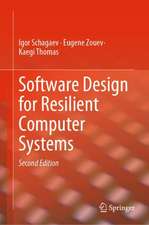Active System Control: Design of System Resilience
Autor Igor Schagaev, Brian Robinson Kirken Limba Engleză Hardback – 16 sep 2017
| Toate formatele și edițiile | Preț | Express |
|---|---|---|
| Paperback (1) | 782.42 lei 6-8 săpt. | |
| Springer International Publishing – 17 mai 2018 | 782.42 lei 6-8 săpt. | |
| Hardback (1) | 647.40 lei 3-5 săpt. | |
| Springer International Publishing – 16 sep 2017 | 647.40 lei 3-5 săpt. |
Preț: 647.40 lei
Preț vechi: 761.65 lei
-15% Nou
Puncte Express: 971
Preț estimativ în valută:
123.90€ • 128.87$ • 102.28£
123.90€ • 128.87$ • 102.28£
Carte disponibilă
Livrare economică 24 martie-07 aprilie
Preluare comenzi: 021 569.72.76
Specificații
ISBN-13: 9783319468129
ISBN-10: 331946812X
Pagini: 306
Ilustrații: XVI, 295 p. 139 illus., 110 illus. in color.
Dimensiuni: 155 x 235 mm
Greutate: 0.61 kg
Ediția:1st ed. 2018
Editura: Springer International Publishing
Colecția Springer
Locul publicării:Cham, Switzerland
ISBN-10: 331946812X
Pagini: 306
Ilustrații: XVI, 295 p. 139 illus., 110 illus. in color.
Dimensiuni: 155 x 235 mm
Greutate: 0.61 kg
Ediția:1st ed. 2018
Editura: Springer International Publishing
Colecția Springer
Locul publicării:Cham, Switzerland
Cuprins
Aviation: Landscape, Classification, Risk Data.- Active System Control and Safety Approach and Regulation in Other Application Domains.- Aircraft Flight Reliability, Safety Landscape of Aircraft Use.- Active Safety Relative to Existing Devices.- Principle of Active System Control (Theory).- Principle of Active System Control: Implementation Aspects.- Active System Control and Its Impact on Mission Reliability.- Flight Mode Concept and Realisation.- Active System Control: Realisation.- Active System Control: Future.
Notă biografică
Professor Igor Schagaev is Director of IT-ACS Ltd Stevenage, UK. He received his PhD in Computer Science in 1983 from the Russian Academy of Sciences, Institute of Problem of Control; Certificate in Business Organization of International Research Program Management, TACIS (EC) 1996; Certificate in Learning and teaching in High Education, University of North London 2001. He is a Fellow of the Institute of Analyst and Programmers (UK) since 1992 and Fellow of British Computer Society since 2013. Igor has previously worked as an Electromechanical Engineer at the Smolensk aviation factory, USSR, a Senior Programmer and Design Engineer at the Institute of Advanced Computations, Central Statistic Bureau of USSR, and as a Head of Fault Tolerant System Branch in Institute of Control Sciences. The latter was combined with work as Senior Design Engineer and System Programmer for Avionics at Sukhoy Design Bureau. Since 1992 Igor has been Director of ATLAB Ltd. Bristol (now converged into IT-ACS Ltd). Since 1983, Igor has published internationally 70+ papers in journals and conferences and seven books. Igor was keynote speaker at World Conferences in UK, China, USA, provided consultancy for Financial Times, Sunday Times, Boston Facultimedia, and Swedish government -- all on the subject of ICT, avionics, and aerospace domains. Igor has been honoured with several industry awards, achievements, and grants. He is author of the Springer titles: V Castano and I Schagaev, “Resilient Computer System Design” and Schagaev I, Kaegi T “Software Design for Resilient Computer Systems”. Since 2007, together with Dr Brian Kirk and Alex Schagaev, Igor holds a patent on Method and Apparatus for Active System Safety, GB 2448351.
Dr. Brian R. Kirk is the founder and Director of Robinson Systems Engineering Ltd. in the UK, which has specialized in designing and building safetyrelated computing and control systems for over 40 years. He received his PhD in Methods of Active System Safety in 2007, formerly attaining an MSc in Industrial Electronics from Imperial College and A BSc (Hons) in Electronics from Salford University in the 1960s. He worked on early graphics based CAD and simulators for microchip design with Marconi Research labs. In the 1970s, he worked as design manager for microprocessors and memories at General Instrument Corp. There, he worked on custom IC design and early 1,4,8,and 16 bit processors, including the PIC series, the Sinclair calculators, and early TV games (such as Pong). After working for Mergenthaler Linotype on system designs during the phototypesetting revolution, he founded Robinson Systems Engineering Ltd. He has presented many papers linking theory to practical applications at conferences around the world and collaborated with Professors’ Wirth and Gutknecht's group at ETH Zurich for over 20 years, co-authoring the Zonnon Language Report. As joint author of the book Programming Oberon in Windows, he released Robinson's Oberon compiler for Windows as part of the Programmers Oberon Workbench as freeware, inspired by the usability and ubiquity of Borland Pascal. More recently he has provided technical advice to US Legal teams on the causes of Sudden Unintended Acceleration in vehicles that contributed to a billion dollar settlement in a single case and contributed to Tom Murray's book Deadly by Design. He is currently working with the Institute of Engineering and Technology (UK) and IEEE on guidance for improving the Electromagnetic Resilience of Systems. He is a member the British Computer Society, Institute of Directors, and life member of the ACM (USA) and the International Society of Bassists, being an enthusiastic double bass player in various jazz bands.
Dr. Brian R. Kirk is the founder and Director of Robinson Systems Engineering Ltd. in the UK, which has specialized in designing and building safetyrelated computing and control systems for over 40 years. He received his PhD in Methods of Active System Safety in 2007, formerly attaining an MSc in Industrial Electronics from Imperial College and A BSc (Hons) in Electronics from Salford University in the 1960s. He worked on early graphics based CAD and simulators for microchip design with Marconi Research labs. In the 1970s, he worked as design manager for microprocessors and memories at General Instrument Corp. There, he worked on custom IC design and early 1,4,8,and 16 bit processors, including the PIC series, the Sinclair calculators, and early TV games (such as Pong). After working for Mergenthaler Linotype on system designs during the phototypesetting revolution, he founded Robinson Systems Engineering Ltd. He has presented many papers linking theory to practical applications at conferences around the world and collaborated with Professors’ Wirth and Gutknecht's group at ETH Zurich for over 20 years, co-authoring the Zonnon Language Report. As joint author of the book Programming Oberon in Windows, he released Robinson's Oberon compiler for Windows as part of the Programmers Oberon Workbench as freeware, inspired by the usability and ubiquity of Borland Pascal. More recently he has provided technical advice to US Legal teams on the causes of Sudden Unintended Acceleration in vehicles that contributed to a billion dollar settlement in a single case and contributed to Tom Murray's book Deadly by Design. He is currently working with the Institute of Engineering and Technology (UK) and IEEE on guidance for improving the Electromagnetic Resilience of Systems. He is a member the British Computer Society, Institute of Directors, and life member of the ACM (USA) and the International Society of Bassists, being an enthusiastic double bass player in various jazz bands.
Textul de pe ultima copertă
This book introduces an approach to active system control design and development to improve the properties of our technological systems. It extends concepts of control and data accumulation by explaining how the system model should be organized to improve the properties of the system under consideration. The authors define these properties as reliability, performance and energy-efficiency, and self-adaption. They describe how they bridge the gap between data accumulation and analysis in terms of interpolation with the real physical models when data used for interpretation of the system conditions. The authors introduce a principle of active system control and safety—an approach that explains what a model of a system should have, making computer systems more efficient, a crucial new concern in application domains such as safety critical, embedded and low-power autonomous systems like transport, healthcare, and other dynamic systems with moving substances and elements. On a theoretical level, this book further extends the concept of fault tolerance, introducing a system level of design for improving overall efficiency. On a practical level it illustrates how active system approach might help our systems be self-evolving.
- Presents the rationale for, and theory of, redundancy, presented for easy application in system design;
- Describes the role of activeness in system design in terms of what is needed to making systems efficient;
- Estimates the benefit of using a new approach of active system control system.
Caracteristici
Presents the rationale for, and theory of, redundancy, presented for easy application in system design Describes the role of activeness in system design in terms of what is needed to making systems efficient Estimates the benefit of using a new approach of active system control system Includes supplementary material: sn.pub/extras


























